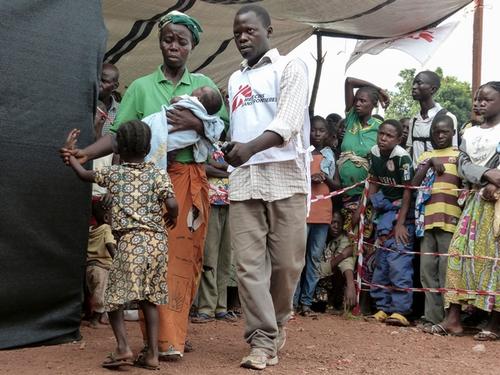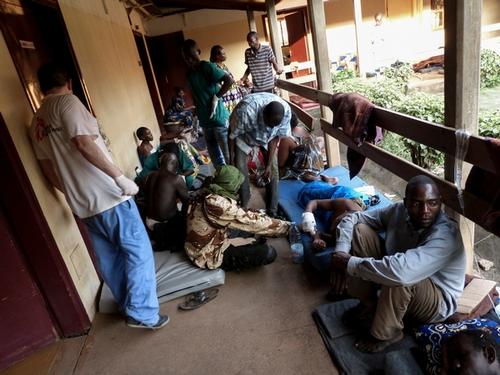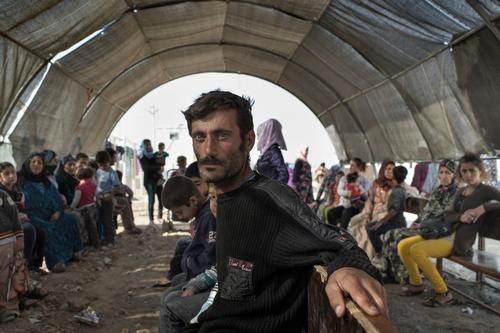Paris, 30 December 2013 – Despite the presence of international armed forces in the capital of Central African Republic (CAR), fighting, lynchings and violent attacks are still a daily occurrence in Bangui, and the situation in the city appears to be out of control.

Since early December, Médecins Sans Frontières (MSF) teams working in several surgical medical city projects have helped more than 1,000 victims of violence. Between 15 and 20 wounded people arrive each day at the Castor health centre, where MSF teams have treated a total of 343 victims of violence since 7 December. At the Hôpital Communautaire, MSF teams are treating 15-20 wounded patients per day, and have provided care for a total of 648 victims of violence between 2 and 27 December. Some 428 of those patients were hospitalised; 368 had gunshot wounds and 128 had wounds caused by machete blades.
“We have been receiving more patients with serious injuries at the Hôpital Communautaire the last few days,” said Laurent Sury, MSF’s emergency coordinator in Bangui. “People are coming in with machete wounds to the head, hands and arms – injuries sustained as they tried to defend themselves. We’ve also seen people who have been stabbed, sometimes multiple times, in the abdomen, and people who have been either tortured or brutally beaten. We have even had a case of impalement. For the most part, these are young men.”
Violence hinders aid provision
Health facilities have also been affected by the violence, hindering the provision of medical aid. An armed man entered the MSF dispensary at Bangui airport on 24 December, while on the same day a man armed with grenades entered the Hôpital Communautaire. On 25 December, there was gunfire and large numbers of armed men in the vicinity of the Hôpital Communautaire, three of whom entered the building, and the teams had to temporarily evacuate the hospital.
On 29 December, a Ministry of Health ambulance was stopped and the ambulance staff were threatened with violence, preventing them from collecting the wounded. On the same day, armed men returned to the Hôpital Communautaire with the intention of lynching a number of patients, while Ministry of Health staff were threatened.
Although the situation was defused on each of these occasions, the security of patients has been repeatedly threatened.
Atmosphere increasingly tense
“The atmosphere is getting increasingly tense with each of these ‘visits’, as the attackers become more and more aggressive and angry,” said Thomas Curbillon, MSF’s head of mission in Bangui. ”It is totally unacceptable that health facilities are not being respected and are being invaded by armed people who constitute a threat to patients and staff. The insecurity and the gunfire in different areas, especially around the hospital, impede people’s ability to move around. It hinders us from reaching wounded people, and also hinders patients who want to reach medical care. The sick and the wounded do not have the timely and secure access to medical care that they need, when they need it.”
On 9 December, MSF called for an end to violence against patients and medical staff working in healthcare facilities in Bangui. Today, MSF reiterates its call to all parties to the conflict in CAR to allow the sick and wounded to receive the medical care that they need. MSF calls for an immediate end to violence against civilians, patients and medical staff working in healthcare facilities, in Bangui and in the rest of the country.
MSF has been working in Central African Republic since 1997, and now runs seven regular projects in Batangafo, Boguila, Carnot, Kabo, Ndéle, Paoua and Zémio, and four emergency projects in Bangui, Bossangoa, Bouca et Bria. By the end of January, MSF hopes to initiate activities in hospitals and Bangassou Uango. In total, MSF is providing free medical care to about 400,000 people in the country, with more than 100 international staff and 1,100 local staff working in seven hospitals, two health centres and 40 health posts across the country.
MSF activities in Bangui
Hundreds of thousands of people who have fled their homes to escape the chaos and have settled in makeshift sites are now at risk of epidemics. MSF is providing medical care, but more help is urgently needed.
MSF teams are providing medical care for around 100,000 displaced people at Bangui airport, doing an average of 800 consultations per day. Some 30 percent of consultations are for malaria, and 20 percent for acute respiratory infections. Teams are assisting at six to seven births each day.
MSF teams are providing medical care for around 34,000 displaced people at the Boy Rabe monastery in Bangui, doing an average of 400 consultations per day. Some 30 percent of consultations are for malaria, 13 percent are for acute respiratory infections and 10 percent are for diarrhoea. Teams are assisting at three to four births each day.
MSF teams are providing medical care for about 27,500 displaced people in the Don Bosco centre in Bangui, doing an average of 140 consultations per day. Some 40 percent of consultations are for malaria, 10 percent are for acute respiratory infections and 16 percent are for diarrhoea. Teams are assisting at three to four births each day.
An MSF team is providing medical and surgical care in the Castor health centre in Bangui. Since 7 December, teams have treated 70 women suffering from obstetrical complications and assisted at 89 uncomplicated births.





